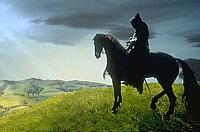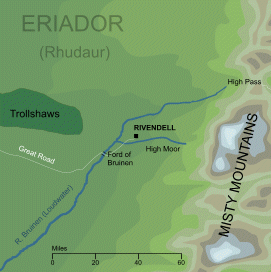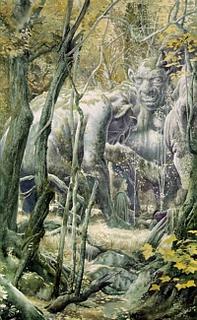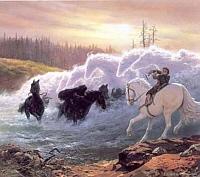FOTR: Bk 1, Ch 12
"'We must make for the Road again.' he said. 'We cannot hope to find a path through these hills. Whatever danger may beset it, the Road is our only way to the Ford.'"Frodo awakens. The other hobbits explain that they saw him disappear and heard his voice, then moments later he reappeared and the Black Riders had dispersed. Here, unlike in the film, Strider isn't the one who drives them away. This is because the way Frodo reacted to the Nazgul is much different. There were really three reasons why they left. The first was Frodo's brandishing a Numenorean blade, to which they were vulnerable. The next reason was because right after being stabbed, Frodo evokes the name of Elbereth. This is the Sindarin elvish name for Varda, Manwe's female counterpart in Valinor which translates to "star-lady". Manwe and Varda are the most revered of the Valar and the elves often evoke the name Elbereth when in danger or need (and remember that for Tolkien names can evoke great power). Lastly, the Riders feel that, because of the nature of the wound he has been given, Frodo can no longer easily flee them. In fact, its effect makes him susceptible to their will. So they intend to return when they have gathered their full strength of nine.
Strider attempts to heal Frodo using the leaves of an herb called athelas (colloquially known as kingsfoil). He will later use this same technique in the Houses of Healing at Minas Tirith. At this point, Frodo wonders to himself "if he would remain maimed for life". While he will eventually recover, the wound would ultimately continue to torment him. He would, in effect, remain "maimed" for the rest of his days in Middle-Earth. It is clear that they must make for Rivendell as quickly as possible. Frodo is too weak to walk so he is given the pony to ride, which has improved in its strength and weight since leaving Bree. They head South past the East Road, to a wooded area that will give them some cover. While no Black Riders are in sight, they hear the calling and answering of their terrifying shrill cries.
 The journey is long and they continue for many days until they need to once again cross the Road by turning North. They're heading for the River Bruinen which forms the Western border of the lands of Rivendell. They must first, however, cross the River Hoarwell (which flows into the Gwathlo, also known as the "Greyflood") by the Last Bridge, an ancient stone bridge with three arches that crosses the valley through which the river runs. At the bridge they are relieved to find no sign of the Riders, but Strider discovers a green beryl, or elf-stone, that he believes was left there intentionally as a sign that the bridge is safe from the presence of the Nazgul. There are allies about as well as enemies.
The journey is long and they continue for many days until they need to once again cross the Road by turning North. They're heading for the River Bruinen which forms the Western border of the lands of Rivendell. They must first, however, cross the River Hoarwell (which flows into the Gwathlo, also known as the "Greyflood") by the Last Bridge, an ancient stone bridge with three arches that crosses the valley through which the river runs. At the bridge they are relieved to find no sign of the Riders, but Strider discovers a green beryl, or elf-stone, that he believes was left there intentionally as a sign that the bridge is safe from the presence of the Nazgul. There are allies about as well as enemies.
While he is in great pain and feels a powerful cold overtaking him, Frodo is lucid enough to ask Strider about Rivendell. He responds, "There my heart is; but it is not my fate to sit in peace, even in the fair house of Elrond." This is another reference to the path that is laid before him as Isildur's heir. He knows that he cannot rest until he fulfills his destiny.
Ten days out from Weathertop, they discover that they have traveled too far North and must turn back Southwards again. They are in the troll-country, or the Trollshaws, which is to the Northwest of Rivendell. Frodo is taking a turn for the worse. His left arm is lifeless. The wound he received has closed up and a small bit of the Morgul blade is lodged in his shoulder. Strider says, "There is some poison or evil at work that is beyond my skill to drive out." They continue to travel as quickly as they can.
One evening, Frodo lay in and out of consciousness: "Frodo lay half in a dream, imagining that endless dark wings rode above him, and that on the wings rode pursuers that sought him in all the hollows of the hills". This dream clearly looks ahead to the future, when the Nazgul search for him astride their winged Fell Beasts later in the story.
Now here it is worth mentioning that it seems to be taking an unreasonably long time to get to  Rivendell. And why if Strider is so familiar with these lands do they seem to be making odd turns and then having even to back-track at one point? Well, part of the problem is that Tolkien painted himself into a bit of a corner when he wrote The Hobbit. In that story it takes Bilbo, Thorin and company a full forty days to travel from Bag End to the house of Elrond. Granted they followed a much more leisurely pace, but roughly the same journey in The Fellowship of the Ring at first seems to take less time.
Rivendell. And why if Strider is so familiar with these lands do they seem to be making odd turns and then having even to back-track at one point? Well, part of the problem is that Tolkien painted himself into a bit of a corner when he wrote The Hobbit. In that story it takes Bilbo, Thorin and company a full forty days to travel from Bag End to the house of Elrond. Granted they followed a much more leisurely pace, but roughly the same journey in The Fellowship of the Ring at first seems to take less time.
Frodo begins his journey from Bag End on September 23rd and arrives at Weathertop on October 6th. This is only fifteen days (which includes an extra night's stay at Tom Bombadil's). In the distance remaining, the party in The Hobbit had traveled twenty-six days before they reached Rivendell and that was while riding ponies. So even if you take into consideration that Strider drove them, with the wounded Frodo, to cover more distance per day than the dwarves the distance between Weathertop and Rivendell should take at least three weeks. Tolkien had encountered an inconsistency that he really hadn't thought through. So this is why in only two chapters they cover such a wide distance compared to previous chapters. Tolkien tried to cover himself in the last chapter:
"I don't know if the Road has ever been measured in miles beyond the Forsaken Inn, a day's journey east of Bree," answered Strider. "Some say it is so far, and some say otherwise. It is a strange road, and folk are glad to reach their journey's end, whether the time is long or short. But I know how long it would take me on my own feet, with fair weather and no ill fortune: twelve days from here to the Ford of Bruinen, where the Road crosses the Loudwater that runs out of Rivendell. We have at least a fortnight's journey before us, for I do not think we shall be able to use the Road."All of this is examined in Karen Wynn Fonstad's The Atlas of Middle-Earth, a fantastic resource. Fonstad, by trade a cartographer, is a huge Tolkien fan and has painstakingly mapped out everything - and I mean everything - in Tolkien's world.
Tolkien even decides to make a stop at a place familiar to readers to The Hobbit. As they follow a worn path, they discover the troll-hole where Bilbo and Gandalf had found their elvish blades, Sting and Glamdring. Further off in a clearing they come upon the three trolls that were introduced in Chapter 2 of The Hobbit and stood there still, having been turned to stone almost eighty years earlier. Frodo and Sam recognize them from the many times Bilbo told them the story. I almost wish, however, that Tolkien had not included this reminder that in his earlier work there were trolls with the names Bill, Bert and Tom that spoke with a cockney dialect. That depiction of trolls seems too inconsistent with the way they are presented in The Lord of the Rings.
I want to share a quick personal note on the troll song that Sam sings at this point. For the longest time I had trouble putting a tune to this song - until I had kids, that is. When my oldest was just a toddler, I became familiar with an old traditional English folk song called "The Fox Went Out On A Chilly Night". I never heard this song in my own childhood but after I had been subject to hearing it over and over, it dawned on me that this Troll song followed the tune of "The Fox" exactly. Also, I can't help but get a chuckle at the part when Sam uses the word "boner" (heh, heh...he said "boner").
This is the second time in two chapters that Tolkien uses a song to break the intensity of the moment, just before he ramps it up again. Later that evening, they encounter Glorfindel, an Elf from Rivendell. It seems that Gildor, the Elf that Frodo, Sam and Pippin met back in Chapter 3, had warned Elrond upon his return journey of the peril that Frodo was in and advised him that the hobbits would be heading East. Many new readers often confuse Gildor and Glorfindel, thinking they are the same character. Anyway, Glorfindel - sent at the request of Elrond - reveals that it was he who left the elf-stone at the Last Bridge. He had been doing his best to chase away any Black Riders in the area. When Glorfindel examines Frodo's wound, he admits that healing it is beyond his skill (much as Strider had said) and that they should make for Rivendell without stopping. The Elf insists that Frodo ride his much-swifter horse, Asfaloth, instead of the pony.
They continue for another couple of days until they are in sight of the River Bruinen. There is a certain point where the river has been forded with stones and it is necessary to cross this in order to continue on to the valley where Rivendell lay. All of a sudden, the Black Riders are upon them and Frodo must ride out at full speed to evade them. At first, he is hesitant as he feels them silently commanding him to wait. Glorfindel orders the horse in the elvish language to ride on! From different directions, the Riders begin to converge on Frodo, calling to him with their fell voices.
The horse carries Frodo across the Ford of Bruinen. Frodo halts Asfaloth and turns to face all nine Nazgul that are approaching the river. He brandishes his Numenorean sword and yells for the Riders to go back. Back to Mordor. "To Mordor we will take you!" they respond, shouting "The Ring, The Ring!" Here Frodo makes a heroic stand against them which unfortunately was removed from the film Fellowship of the Ring. "By Elbereth and Luthien the Fair," said Frodo, "You shall have neither the Ring nor me!"
 As the Riders begin to cross, an unknown power causes a change in the river:
As the Riders begin to cross, an unknown power causes a change in the river:
"At that moment there came a roaring and a rushing: a noise of loud waters rolling many stones. Dimly Frodo saw the river below him rise, and down along its course there came a plumed cavalry of waves. White flames seemed to Frodo to flicker on their crests and he half fancied that he saw amid the water white riders upon white horses with frothing manes. The three Riders that were still in the midst of the Ford were overwhelmed: they disappeared, buried suddenly under angry foam. Those that were behind drew back in dismay."
The remaining black horses are filled with madness and they rush headlong into the flood. All of the Riders are washed away. Once again, Frodo loses consciousness.
Here ends Book One of The Fellowship of the Ring. The story continues in Book Two with Chapter One: Many Meetings
------[Chronology: October 6th through October 20th 3018 T.A.]
------
(revised 8/27/06)


3 Comments:
Any thoughts on the "unknown power" that changes the river?
Elrond's elvish magic? His power in Rivendell? His Ring of Power? (Am I even recalling correctly that he has one of the elvish rings?)
Yes. You guessed right. In the first chapter of Book Two, Many Meetings, Gandalf reveals to Frodo the source of the "magic" at the Ford.
"Elrond commanded it, " answered Gandalf. "The river of this valley is under his power, and it will rise in anger when he has great need to bar the Ford."
As for the watery "cavalry", that was Gandalf's doing. "I added a few touches of my own: white horses with shinging white riders; and there were many rolling grinding bolders."
Both Elrond and Gandalf are bearers of elvish rings. Elrond wears Vilya, the ring of air (Gil-galad was its original owner) and Gandalf wears (though secretly) Narya, the ring of fire, which was given to him by Cirdan the Shipwright upon his arrival to Middle-Earth. No doubt both are of assistance in this rather dramatic manipulation of nature.
Phew! I caught up. Well, passed actually, I'm into Book 2 already.
Maybe now I can keep up with the debate at the Llama's.
Keep up the good work.
Post a Comment
<< Home